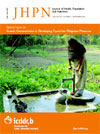
|
The Journal of Health, Population and Nutrition
icddr,b
ISSN: 1606-0997
EISSN: 1606-0997
Vol. 36, No. 1, 2017, pp. 1-10
|
 Bioline Code: hn17034
Bioline Code: hn17034
Full paper language: English
Document type: Research Article
Document available free of charge
|
|
|
The Journal of Health, Population and Nutrition, Vol. 36, No. 1, 2017, pp. 1-10
| en |
The association between health insurance status and utilization of health services in rural Northern Ghana: evidence from the introduction of the National Health Insurance Scheme
Dalinjong, Philip Ayizem; Welaga, Paul; Akazili, James; Kwarteng, Anthony; Bangha, Martin; Oduro, Abraham; Sankoh, Osman & Goudge, Jane
Abstract
Background: Many households in low- and middle-income countries face financial hardships due to payments for
health care, while others are pushed into poverty. Risk pooling and prepayment mechanisms help to lessen the
impact of the costs of care as well as assisting to achieve universal health coverage (UHC). Ghana implemented the
National Health Insurance Scheme (NHIS) for the promotion of access to health services for all Ghanaians. In this
paper, we examined the association between health insurance status and utilization of outpatient and inpatient
health services in rural poor communities.
Methods: The study was a cross-sectional household survey conducted in the Kassena-Nankana districts of
Northern Ghana. We conducted interviews in 11,175 households and collected data on 55,992 household members.
Multiple logistic regression models were used to identify factors associated with the utilization of outpatient and
inpatient health services. The dependent variables were the utilization of outpatient and inpatient health services.
We adjusted for several potential socio-demographic factors associated with utilization and health insurance status.
Results: Significantly, the insured had 2.51 (95% CI 2.3–2.8) and 2.78 (95% CI 2.2–3.6) increased odds of utilizing
outpatient and inpatient health services respectively. Respondents with a history of recent illness or injury [32.4
(95% CI 29.4–35.8) and 5.72 (95% CI 4.6–7.1)] and poor or very poor self-reported health status [2.08 (95% CI 1.7–2.5)
and 2.52 (95% CI 1.9–3.4)] and those on chronic medication [2.79 (95% CI 2.2–3.5) and 3.48 (95% CI 2.5–4.8)] also
had increased odds of utilizing both outpatient and inpatient health services respectively. Among the insured, the
poorest use the Community-based Health Planning and Services (CHPS) compounds, while the least poor use
private clinics and public hospitals for outpatient health services. The uninsured predominately use pharmacies or
licensed chemical shops (LCSs). For inpatient health services, the insured largely use public hospitals, with the
uninsured using private clinics or public health centres.
Conclusion: The findings suggest that being insured with the NHIS is associated with increased utilization of
outpatient and inpatient health services in the study area. Overall, the NHIS can be an effective tool for achieving
UHC and hence pragmatic efforts should be made to sustain it.
Keywords
National Health Insurance; Social health insurance; Health service; Utilization; Outpatients; Inpatients; Insured; Uninsured; Ghana
|
| |
© Copyright 2017 - The Author(s)
Alternative site location: http://www.jhpn.net
|
|
